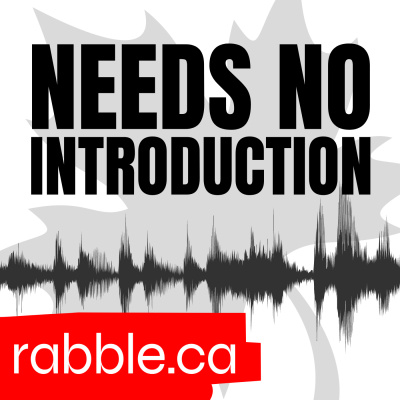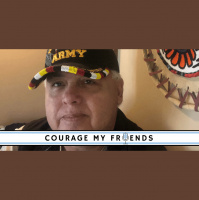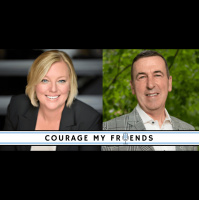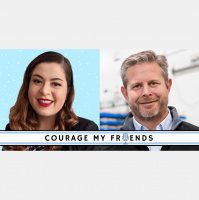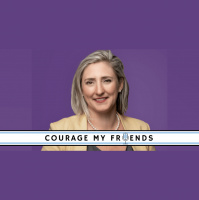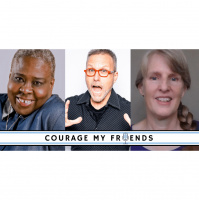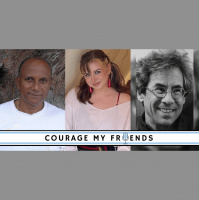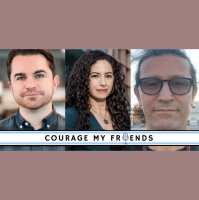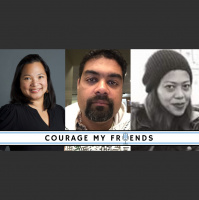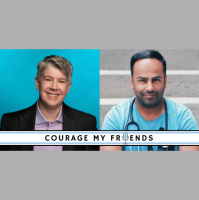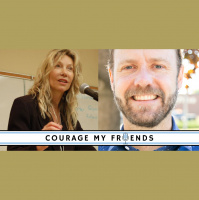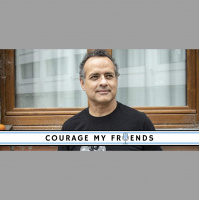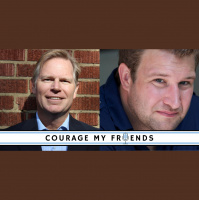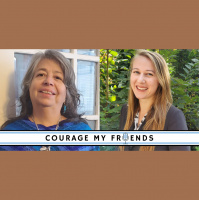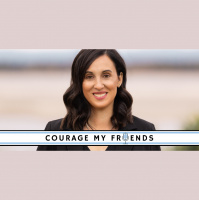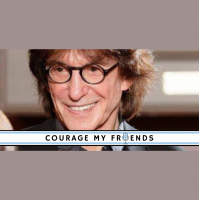Sinopsis
A series of speeches and lectures from the finest minds of our time. Fresh ideas from speakers of note.
Episodios
-
COP15 and 30x30 Pt. II: Indigenous led conservation and saving the Greenbelt
30/01/2023 Duración: 47minIn the second part of this two-part episode of the Courage My Friends podcast COP15 and 30x30: Indigenous-Led Conservation and Saving the Greenbelt, manager at Springwater Provincial Park and former Chief of the Beausoleil First Nation, Jeff Monague, discusses principles of Indigenous-led conservation, the dangers facing First Nations communities from Greenbelt development and the need to shift our thinking in order to reconnect with the natural world. Reflecting on the meaning of reconciliation, Monague says: “We can't think about conservation if we don't live or try to live that conservation…We're not doing that enough. In Canada, the government needs to do more. If it is reconciliation that they're talking about, then they need to do more...Reconciliation won't happen if all of your partners are not included. Let's say we're going to spend $30 million on a project and then we'll give 1% of that to First Nations. That's not reconciliation.” About today’s guest Jeff Monague is a member of the Beausoleil Fi
-
COP15, and 30x30 Pt.I: Turning the Tide on Biodiversity Loss and Mass Extinction
16/01/2023 Duración: 01h06minIn this two-part episode of the Courage My Friends podcast, Tim Gray, executive director of Environmental Defence and Sandra Schwartz, national executive director of the Canadian Parks and Wilderness Society (CPAWS) discuss the crisis of biodiversity loss and mass extinction, Canada’s commitments under the Kunming-Montreal agreement coming out of the global COP15 gathering on biodiversity, and challenges and strategies toward meeting this very ambitious and even more necessary target. According to Schwartz: the UN has reported recently,.. that around a million animal and plant species are now threatened with extinction. And that is really within a few decades. That's more than ever before in human history. And that's largely a result of human interaction with nature. So whether that is from exploration, from mining for example, forestry, …clearly we need to act now to save the natural world, because it is sustaining us as humans. Speaking to the recent Kunming-Montreal Global Biodiversity Framework, Schwartz
-
Who’s hungry… and why? Food banks, food insecurity and ending hunger for good
19/12/2022 Duración: 57minIn this episode of the Courage My Friends podcast, Neil Hetherington, CEO of The Daily Bread Food Bank and Maria Rio, director of development and communication for The Stop Community Food Centre discuss the current state of food insecurity in Canada’s largest city, how we got here and what we need to end decades of hunger. Of the growing reliance on Toronto’s food bank system, Hetherington says: “What is startling is the fact that there are over 9,000 new registrants to the Foodbank system in the Toronto area, served by Daily Bread and North York Harvest each month.. almost 10,000 people are putting up their hand and saying, "I am in a position where my income does not meet the expenses that I have and I need to rely on food charity this week or this month. …Prior to the pandemic, 15% of the people that came to the food banks were employed fully. That number has doubled to 30%. And just around 50% of food bank users have a post-secondary education. And so people have done what we told them to do growing up. G
-
From contract negotiation to political protest: reflecting on Ontario’s education workers’ fight for jobs, rights and dignity
12/12/2022 Duración: 41minIn this episode of the Courage My Friends podcast we welcome Laura Walton, president of CUPE’s Ontario Schools Boards Council of Unions. Just days after CUPE education workers voted to ratify a new four-year contract that includes a hard fought for $1 flat-rate hourly wage increase and two days repayment for a fraught political protest, we reflect on the momentous and contentious labor action taken on by Ontario's education workers. Reflecting on how essential these education workers are to our schools, Walton says: "From the minute that a child or a member of the public steps into a school; you are stepping into a space that is impacted by the work performed by CUPE members … the cleanliness of the school, the safety of the school. Being buzzed in the door in our elementary schools. The supports that students need in order to be successful and to thrive are all performed by education workers." Walton describes Bill 28 and its use of the notwithstanding clause: “Bill 28 was actually a two-headed beast ... No
-
Home is where the earth is: The climate crisis meets the housing crisis
28/11/2022 Duración: 58minIn this episode of the Courage My Friends podcast, Emmay Mah, executive director of the Toronto Environmental Alliance (TEA) discusses the many intersections between the climate crisis and the housing crisis and the potential fallout from Ontario’s proposed housing Bill 23: More Homes Built Faster. According to Mah: “We need to acknowledge that we are experiencing a deep, acute housing crisis. And this is also an environmental crisis.” Reflecting on the Ford Government’s proposed Bill-23: The Better Homes Built Faster Act, Mah says: “The title of the Bill .. is incredibly misleading. It is both bad for addressing the housing crisis and bad from a climate perspective, and there are no two ways around that. ..Basically what this bill proposes to do is it's going to gut about 10 existing provincial laws, which will ultimately strip local governments of their ability to build and protect affordable housing and achieve their climate goals and basically protect the environment and plan communities within municipal
-
Mouth open, story jump out: The power and purpose of storytelling in these times – Part two
07/11/2022 Duración: 01h07minIn part two of this special two-part episode of the Courage My Friends podcast ‘Mouth Open, Story Jump Out: The Power and Purpose of Storytelling in These Times,’ we continue our conversation with storyteller, actor, playwright and filmmaker, Rhoma Spencer; storyteller and teacher, Lynn Torrie; and storyteller, teacher and founder of Queers in Your Ears, Rico Rodriguez. Speaking to the origins of Carnival and the meaning of stories for the formerly colonized and enslaved, Spencer reflects: “Stories [are] indeed a part of resistance. These are stories that my mother talked about. Some she would've experienced and some that would've been passed on to her..These are stories that was told to me. Carnival as manifested through the post-emancipated African was a form of resistance. When we were emancipated in 1834, we took to the streets to celebrate our emancipation, and we did so by mimicking our colonizer.” According to Torrie, stories are a vehicle to deal with even the most sensitive of subjects: “What I find
-
Mouth open, story jump out: The power and purpose of storytelling in these times
31/10/2022 Duración: 53minIn the fourth, two-part, episode of the Courage My Friends podcast, series III, we are joined by six Canadian storytellers In this special, and very storied, two-part episode of the Courage My Friends podcast Mouth Open, Story Jump Out: The Power and Purpose of Storytelling in These Times, we are very pleased to welcome six Canadian storytellers. In part one, we begin our conversation with First Story storyteller, Teagan de Laronde; actor, author, and storyteller. Richardo Keens-Douglas; and community animator, author and co-founder of Storytelling Toronto, Dan Yashinsky. Within her story within a story, storyteller, de Laronde says: “In Toronto, like many places, there are many stories of the land; in the land, based on the land. I think one of the biggest misconceptions about Toronto is that there are no Indigenous stories. We tend to see urban places as non-Indigenous spaces.Toronto though is a city, is an urban space because of Indigenous design. It was a meeting place, a council ground, a shared space,
-
Home is where the community is: Homelessness, housing insecurity and housing as a human right
11/10/2022 Duración: 56minIn the third episode of the Courage My Friends podcast, Series III, Dania Majid, director of the Tenant Duty Council Program at the Advocacy Center for Tenants Ontario (ACTO); John Ecker, director of Research and Evaluation at the Canadian Observatory on Homelessness; and Haydar Shouly, senior manager of Shelters and Shelter Programs with Dixon Hall discuss the current crisis of housing insecurity and homelessness facing our most vulnerable communities. Ecker describes some of the ingredients of the housing crisis: “In Toronto we're seeing an emergency shelter system that's stretched to the limit, which is turning people away because there aren't enough beds available. ..We're seeing a significant increase in the number of people experiencing chronic homelessness or homelessness lasting six months or longer in Toronto…About half of people accessing emergency shelters can be defined as chronically homeless. We're also seeing a burnt out workforce that is leaving the homeless system for other opportunities. We'
-
Migrant workers and 'the pandemic paradox': The unseen hands that truly keep us afloat
26/09/2022 Duración: 01h01minIn the second episode of the Courage My Friends podcast, Series III, Jhoey Dulaca (caregiver and organizer with the Migrant Workers’ Alliance for Change), Ethel Tungohan (Canada Research Chair in Canadian Migration Policy, Impacts and Activism) and Chris Ramsaroop (activist and organizer with Justicia for Migrant Workers) discuss temporary foreign workers in Canada, the multiple and barriers they face and the struggle for recognition, rights and belonging. Speaking to the situation facing foreign migrant workers, Dulaca says, “In the beginning it was a dream. It's not what happens in reality. The promise of Canada is when you get in, you are allowed to apply for permanent residence. That's the selling point, why I came here… They allow you to come here, but they won't allow you to have permanent status. And with permanent status, you are exercising your rights.” Dulaca continued: “A lot of these people are tied to their employers. When I was working as a caregiver, I was tied to my employer and I couldn't d
-
Privatization of public health: Protecting universal healthcare for the common good
14/09/2022 Duración: 01h16sIn the launch of our third season, JP Hornick, President of OPSEU/SEFPO and Dr. Naheed Dosani, Palliative Care Physician and Health Justice Activist, discuss the current crisis facing public healthcare in Ontario and the alarming turn toward the privatization of our healthcare systems by those prioritizing profit over patients. In speaking to the ways in which the healthcare crisis is both the result and rationale for erosion and greater privatization, JP Hornick says: “...you've got a kind of perfect storm that COVID maximized a crisis that was already existing. Decreased funding, unanticipated service costs, then you throw in on top of that supply-chain issues, particularly around PPE, but also, tools and resources. And then you've got an ongoing problem with recruitment and retention of staff. These are the new realities that hospitals have to tackle at the same time, trying to care for patients. And they're not allowed to carry deficits. So in the absence of additional funding, it means that the choices t
-
Climate anxiety and climate justice organizing: Fearing the future, finding hope and fighting for our planet – Part 2
18/07/2022 Duración: 45minIn the final episode of our summer series, climate justice organizer and activist Aliya Hirji and National Chairperson of the Canadian Federation of Students, Mari Dolcetti-Koros, discuss the global climate crisis, its impacts on our younger populations and the ways in which youth are organizing and taking leadership in securing a truly just and sustainable world for us all. In speaking to the need for youth leadership, Hirji says: “I think I hear a lot from world leaders, the phrase like “young people are leaders of the future”, but the truth is that we are the leaders of right now. There's so much on every scale - local, national, international - so much of this climate action and this ambition and real progressive ideas that are coming from young people. I think young people have an insane amount of optimism and passion and drive that you may not see from other generations. … I think that our optimism and our outlook on life is really unique. And because we have so much of our lives ahead of us, well, hop
-
Climate anxiety and climate justice organizing: Fearing the future, finding hope and fighting for our planet – Part 1
11/07/2022 Duración: 47minFor the first segment of this special two-part episode, climate justice activist and originator of Land Back, Bryanna Brown discusses the critical need for Indigenous rights and ways of knowing and youth leadership to combat a climate crisis rooted in systems of colonial oppression and capitalist greed. Making the connection between climate and colonialism, Bryanna Brown says: “One quote that Indigenous Climate Action uses that I really like is: ‘Colonialism caused climate change; Indigenous Rights are the solution.’ We are left out from so many spaces and so many decision making processes and tables throughout history. Because our culture is to protect the land. I think Indigenous Peoples are very important to be investing in, in terms of being able to come up with solutions, not false solutions, actual solutions to the climate crisis. But because of the colonial violence that we continue to experience and because it is a culture of honoring profit over people; it’s really, really hard to get a say when y
-
COVID, inequality and the billionaire space-race
04/07/2022 Duración: 54minIn the sixth episode, Linda McQuaig and Ian Thomson discuss the rising fortunes of the billionaire class amid shrinking incomes and opportunities for the vast majority before and during the pandemic. In speaking about the impacts of billionaires on our democratic systems, McQuaig says, “this accumulation of wealth in the hands of billionaires... It’s not just that it’s tremendously unfair, which of course it is, it’s that it gives them so much political power that they get to effectively control the world… The wealthy corporate elite now has so much power that it can effectively block any kind of collective action. And that’s exactly what they’re doing. The reason that there isn’t progress on climate change isn’t that the public is resistant. The public would actually like there to be action on climate change. It’s the immensely powerful interests in the fossil fuel industries that are single-handedly blocking that.... it’s not just unfair they have all that money; it’s detrimental to the survival of the huma
-
Covid, capitalism, climate: The standard of double-standards between the global north and the global south
27/06/2022 Duración: 01h05minIn the fifth episode, historian, researcher, celebrated writer and executive director of Tri-Continental Institute for Social Research, Vijay Prashad discusses the standard of double standards that have long plagued the relationship between the power-holding centres of the Global North and the world’s majority of the Global South. Vijay Prashad describes the Tri-Continental Institute for Social Research as: “associated with this project of internationalism. And our agenda as a research institute is essentially to amplify the voices of movements. To bridge the gap between movements and intellectual activity and to create a kind of intellectualism that develops its confidence, its clarity from the lessons learnt by people in struggle. .. We see ourselves rooted in a very long tradition that goes back to early scholarship in the 19th century ... Dadabhai Naoroji who in the 19th century contested British colonial claims about a mission civilization in Britain ... We see ourselves in the tradition of the Pan-Afric
-
Mental health in the workplace: Are we working well?
20/06/2022 Duración: 51minIn the fourth episode, we discuss the upcoming report from the Douglas Coldwell Layton Foundation on Mental Health and Wellness in the Workplace with project leads Jon Weier and Tom Parkin. In speaking to the necessity of this report, Jon Weier says “..this is really a systemic issue. Mental health impacts or mental distress is something that affects many, many workers. We specifically are looking at how this is related to the workplace and to the idea of work. But of course, as you and others have pointed out on this podcast and in other places, mental health distress over a number of issues is really becoming almost a defining factor of our age. And I think as a result, this kind of research and this kind of examination and understanding of the impacts of our society more broadly on mental health is a really, really important direction to be going right now in this research.” “It's not just that people struggle with mental health effects because of the workplace though, the research is clearly there. But pe
-
Conflict, climate and refugees: Borderless crises in a bordered world and the politics of asylum
13/06/2022 Duración: 01h01minIn the third episode, we speak with Loly Rico of the FCJ Refugee Centre and Rachel Bryce, from the Canadian Association of Refugee Lawyers about the multiple issues facing those fleeing poverty, destabilization, the borderless crises of conflict and climate change and the responsibility of Canada to provide asylum. “Refugee is defined as someone who is unable or unwilling to return to their country of origin due to a well-founded fear of being persecuted on five grounds. Those grounds are: race, religion, nationality, membership of a particular social group, or political opinion. But as you so rightly point out, climate is not one of those,” says Rachel Bryce. “I think that Canada being a signatory country is violating the Refugee Convention. Because the convention says that anyone who shows up at your borders, you must provide access for protection. And with the Safe Third Country Agreement, they don't provide that. They just limited the access for protection to too many people,” says Loly Rico. About today
-
Ecological grief: Mourning the past, fearing the future and finding hope
06/06/2022 Duración: 56minIn the second episode, we speak with Ashlee Cunsolo, a leading voice on climate change and ecological grief, about the growing issue of ecological grief, how it is being experienced and the power that can come from mourning. “For so many people all over the world and particularly Indigenous Peoples all over the world, this connection to the environment, this grieving over the loss of more than humans - whether they're plants or animals or ecosystems - that kinship with other beings and then grieving other beings is certainly not new,” Cunsolo says. Cunsolo continues: “If we are facing ‘code red for humanity’ - if we are facing 1 million species at a risk of extinction and decline; that is an era of loss and damage. And that is an era of grief. And we're going to be called to grief-work. And we're going to have to do this together. And do it hopefully in a way that doesn't cause more harm, but actually might bring us together for big ethical and political changes. And for really uniting people to create a dif
-
Education, critical pedagogy and the future of learning in a post-pandemic world
30/05/2022 Duración: 51minThe Tommy Douglas Institute and rabble.ca, with the support of the Douglas-Coldwell Foundation, proudly present the Courage My Friends podcast. In the first episode of this year’s Courage My Friends podcast series, we welcome author, public intellectual and celebrated scholar of the Critical Pedagogy Movement, Henry Giroux. Does education have a moral and political purpose? What do we mean by critical pedagogy - and why is it so vital in these times? Our guest, Henry Giroux, joins host Resh Budhu to talk about education, critical pedagogy and the future of learning in a post-pandemic world. “We need to understand that education is so vital and so crucial in respect to whether or not a democracy can succeed or not, that we've got to do everything we can to protect the institutions that constitute themselves as schools and public schooling,” Giroux says. “We [also] need to take the question of the imagination seriously. How do we not just talk about what kids need to work; why can't we talk about what they ne
-
Canada's place in the world -- Green party leadership debate
16/09/2020 Duración: 01h46minOn September 10, rabble.ca and the Canadian Foreign Policy Policy Institute hosted a debate with Green party leadership hopefuls. Listen to it here.
-
The growing threat of privatization
04/09/2020 Duración: 55minThe COVID crisis is showing us more consequences of putting profits before people. Hear a panel discussion from the Canadian Labour Congress about the problem and some possible solutions.
